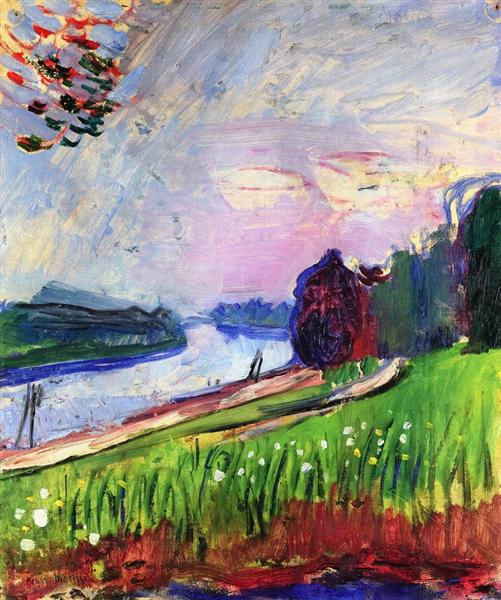Description
Henri Matisse, noted for his fundamental role in the development of modern art, offers us with his painting "Copse of the Banks of the Garonne" from 1900 a unique and personal vision of the natural landscape on the banks of the Garonne River. In this work, Matisse demonstrates a combination of techniques and styles that were beginning to evolve in his artistic career, at a time when the artist was still in full exploration of his own visual language.
The painting, of moderate dimensions (51x60 cm), presents a composition that clearly shows the influence of Impressionism, a movement that significantly impacted Matisse in his early years. This canvas captures the essence of a group of trees on the riverbank, with their upright trunks, leaves inhabiting those intermediate spaces, and flashes of light filtering through the foliage. The naturalness of the scene is achieved without falling into hyperrealism, offering the viewer a perception that is both visual and emotional.
The colors in "Copse of the Banks of the Garonne" are another key element. Matisse, who would later be known for his masterful use of color, was already beginning to experiment with bolder and more vibrant palettes at this time. Here, the green of the trees is varied and rich, suggesting different textures and depths within the same natural element. The tones of the earth and sky complement the composition harmoniously, enhancing the naturalness of the scene. However, we do not find the typical vibrant chromaticism of his Fauvist phase; instead, we see a more controlled and nuanced approach.
One of the intriguing aspects of this work is the absence of human figures, which is striking given that many of his contemporaries often integrated human activity into their landscapes to bring them to life. This absence can be interpreted as an attempt by Matisse to focus on the purity of nature, or perhaps simply a moment of contemplative tranquility, a serene respite away from bustling urban scenes.
It is also interesting to note how the perspective and handling of space in this work suggest an immersive environment, inviting the viewer to enter the painting and visually explore the intricate textures and shadows that unfold among the trees. This subtle technique shows Matisse's ability to create atmospheres loaded with spatial depth, which would be a constant in his later works.
Although "Copse of the Banks of the Garonne" is not one of Matisse's most widely discussed works, it offers an invaluable window into his early experiments and artistic reflections. It is a piece that precedes his more recognizably Fauvist phase and shows us the foundations upon which he would build his revolutionary career in modern art. The work joins the vast collection of landscapes that Matisse painted throughout his life, each reflecting his changing interests and his constant evolution as an artist.
In summary, "Copse of the Banks of the Garonne" is a work that stands out for its delicacy and its ability to capture the essence of a natural environment through a thoughtful composition and expert use of color. This painting offers a fascinating view of Matisse's artistic journey and his constant search for new ways to represent the everyday in extraordinary forms.

